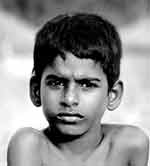Over 1500 child soldiers detained by LTTE and Karuna faction-UNICEF UNICEF highlighted cases of over 1500 children under the age of 18, being detained as child soldiers by the LTTE and the Karuna faction. “Starting from as early as seven years, no less than 1470 children in Sri Lanka are currently detained by the LTTE in preparation to become soldiers, while at least 67 are being held by the Karuna faction,” Sri Lanka Representative for UNICEF, JoAnna Van Gerpen, said. A three-member UNICEF delegation visited Killinochchi recently to meet with the LTTE, to urge the militant group to stop further recruitment of underage fighters and the immediate release of those already enlisted. “An additional cause for concern is the rapid enrolment of children to the Karuna faction, which averages approximately 30 cases of recruitment per month. These cases have been reported to UNICEF by parents and we are very concerned about the rate at which children are being recruited by this group,” Ms. Van Gerpen added.
“We have a political commitment from the LTTE to release all children under the age of 18 and we have no such understanding with the Karuna group at present. UNICEF is steadfastly trying to establish such a commitment from this group. So far, their response has not been encouraging as they have denied these allegations,” she said. The ratio of boy/girl child soldiers detained by the LTTE is maintained at three boys to two girls. However, of the cases reported recruitment by the Karuna faction has been 100 percent male. “In our experience, approximately only one third of such cases of recruitment are reported by the families to the authorities. The reasons behind this may be the fear of repercussions, lack of awareness that cases could be reported to the UNICEF and voluntary recruitment to the forces,” she stressed. Although reported cases only comprise a fraction of the total estimated number of underaged recruitment, UNICEF is only mandated to verify and monitor the cases reported to the office primarily by families. Of these cases reported, approximately 10 percent of the families have asked UNICEF not to appeal on their behalf to the LTTE. However, in a statement last month the LTTE declared they had handed 16 children between the ages of 15-17 back to their families. The statement also said that names of 33 young children have been given to UNICEF and the International Committee of the Red Cross and the remaining 17 children were in the process of being released. Van Gerpen also pointed out saying, “Such children who are released have a wide variety of experience and an assessment is done on each child to determine the kind of support, which is needed to reintegrate the child in his community. As we have no access to the LTTE camps, we do not know what kind of training these children have to go through. However, we persistently request access to these camps to work directly with the children.” The reintegration process of an ex-child soldier within their community is unique for every child. Therefore, an assessment of the child’s needs is done and then, the child is linked with centres for vocational training or educational institutes. UNICEF combines with various organisations such as the International Labour Organization (ILO), United Nations Development Program (UNDP) and Save the Children to reintegrate an ex-child soldier within his community. “The LTTE continues to recruit and use child soldiers and there has been a significant number of cases reported to the office that the Karuna faction has been recruiting children under the age of 18,” The UN Special Representative for children and armed conflict, Radhika Coomaraswamy told the Sunday Times. “I have appointed the former Canadian Ambassador for the United Nations Alan Rock to visit Sri Lanka and analyse the first hand situation with regard to child recruitment on the ground. The dates of his visit will be finalised in consultation with the Government of Sri Lanka, UN parties and other relevant groups,” she said. The United Nations Security Council Resolution 1612 (2005), which strongly condemns the recruitment and use of child soldiers by parties to armed conflict, is currently being implemented in Sri Lanka. “The situation in Sri Lanka will be discussed at length at the next bi-monthly Security Council working group meeting in August. We hope to coordinate the implementation of resolution 1612 (2005) with the Government of Sri Lanka before this meeting,” Ms. Coomaraswamy said.
|
||||
Copyright © 2006 Wijeya Newspapers
Ltd. All rights reserved. |
